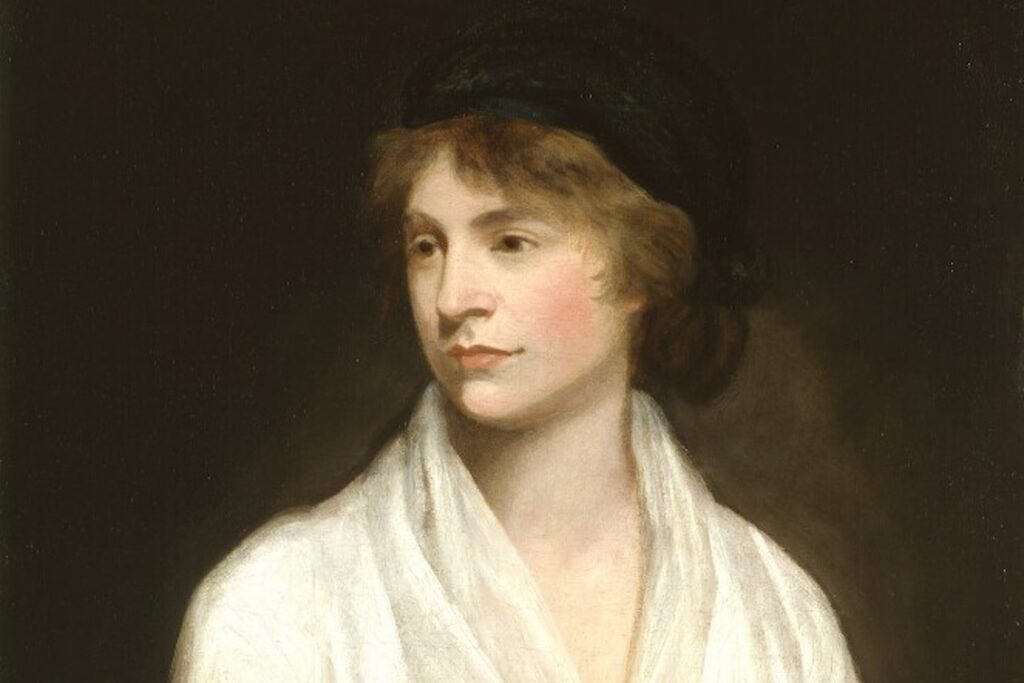
Published June 26, 2023
In 1978, the University of Chicago Press journal Signs published a short essay introducing Mary Wollstonecraft’s lost anthology of prose and poetry she had published “for the improvement of young women.” Wollstonecraft’s anthology reproduced edifying fables and poetry; excerpted from the Bible, Shakespeare, and Milton; and included four Christian prayers Wollstonecraft had authored herself. Among the last is a lengthy “Private Morning Prayer” which reads, in part:
Though knowest whereof I am made, and rememberest that I am but dust: self-convicted I prostrate myself before thy throne of grace, and seek not to hide or palliate my faults; be not extreme to mark what I have done amiss—still allow me to call thee Father, and rejoice in my existence, since I can trace thy goodness and truth on earth, and feel myself allied to that glorious Being who breathed into me the breath of life, and gave me a capacity to know and to serve him.
Though Wollstonecraft is now regarded a canonical thinker in the fields of history, political science, and gender studies, secular feminist scholars still struggle to make sense of her religiosity. Many suggest, as Moira Ferguson did in her 1978 Signs essay, that Wollstonecraft’s own skepticism grew as she crafted her more influential political work. Meanwhile, religious thinkers tend to ignore her religiosity, subscribing to the selfsame interpretation of her as a duly secular proto-feminist.
Enter Modern Virtue: Mary Wollstonecraft and a Tradition of Dissent (Oxford) by Emily Dumler-Winckler, the first adequately theological treatment of Wollstonecraft’s pedagogical, social, and political thought. In a beautifully written, deeply learned, and insightful book, the St. Louis University theologian maintains that there is far greater continuity throughout Wollstonecraft’s work than scholars realize. The imitatio Christi commended in her early publications, including the Female Reader, is the key that unlocks her entire corpus. Deftly employing knowledge of Plato, Aristotle, Augustine, and Aquinas, but also Burke, Rousseau, Kant, Hume, and Paine, Dumler-Winckler situates Wollstonecraft in the Western canon as the seminal philosophical and theological thinker she rightly is.
Dumler-Winckler is at her best in revealing the kinship between Wollstonecraft and the pre-moderns, and distinguishing her from contemporaries like Kant. Such scholarly care helps Dumler-Winckler show how Wollstoncecraft’s thinking about virtue, justice, and friendship can inform those who resist various racial and economic injustices today.
However, Dumler-Winckler is less convincing in her efforts to distinguish Wollstonecraft’s pre-modern insights from those she dubs (and derides) “virtues’ defenders,” namely, Alasdair MacIntyre, Stanley Hauerwas, and Brad Gregory. Certainly, their thought—like the “virtue despisers” she more charitably challenges—would be well served by the rich encounter with Wollstonecraft that her book offers. But given Dumler-Winckler’s own judicious critiques of our modern ills, these “defenders” (especially Gregory) may be more friends than the foes she imagines.
Cultivating the Virtues through the Moral Imagination
Given Wollstonecraft’s sharp critique of Edmund Burke’s (prescient) condemnation of the French Revolution—as well as her Enlightenment-era claim of “natural rights” for women—Wollstonecraft has long been regarded a paradigmatically liberal thinker: akin to a female Thomas Paine, a feminist John Locke, a proto-Kantian. However, some scholars in recent decades have rejected these inapt comparisons, with most now placing her, rightly in my view, in the civic republican tradition that dates to Cicero. This reexamination of Wollstonecraft’s thought has also allowed for greater scrutiny of her argument with Burke over the French Revolution, with some now seeing far more affinity between the two English thinkers than was previously thought.
Dumler-Winckler’s 2023 book deepens these insights by foregrounding Wollstonecraft’s early pedagogical texts as the key that unlocks her account of the virtues, which itself is the prism through which to view her entire corpus. Throughout Modern Virtue, Dumler-Winckler strongly contests the view that Wollstonecraft’s account of virtue resembles that of the rationalist Kant, or the “naked” rationalism of the French revolutionaries Burke rightly scolds. Early on, Wollstonecraft writes: “Reason is indeed the heaven-lighted lamp in man, and may safely be trusted when not entirely depended on; but when it pretends to discover what is beyond its ken, it . . . runs into absurdity.” As Dumler-Winckler shows, respect for the ennobling human capacity for reason and its limits can be found throughout her work.
But Dumler-Winckler also ably distinguishes the proto-feminist from the “sentimentalism” of Hume, the “voluntarism” of some Protestant contemporaries, and the “traditionalism” of Burke. Dumler-Winckler finds the golden mean by looking beyond the moderns with whom Wollstonecraft is too hastily classified to show her kinship with ancient and medieval thinkers, especially Aristotle and Aquinas. It’s in the rich Christian tradition especially that Wollstonecraft finds dynamic resources to bring to bear on her “modern” subjects (abolition and women’s education, in particular)—even as the late-eighteenth-century thinker refines the tradition for the “revolution in female manners” she seeks to inspire. Thus, the seemingly incongruous subtitle: “a Tradition of Dissent.”
“The main business of our lives is to learn to be virtuous,” the pedagogue wrote in Thoughts on the Education of Daughters (1787). For Wollstonecraft as for Aristotle and especially Aquinas, argues Dumler-Winckler, one learns to be virtuous through the gradual refinement of all the faculties in a dynamic engagement of the imagination, understanding, judgment, and affections—especially through imitating the patterns of Christ-like moral exemplars. “Teach us with humble awe to imitate the divine patterns and lure us to the paths of virtue,” Wollstonecraft writes. One “puts on righteousness,” then, not ultimately as a rule obeyed, a ritual practiced, or a philosophical tenet held, even as obedience, rituals, and understanding are, for Wollstonecraft, all essential components.
Rather, one “puts on righteousness” as a kind of “second nature,” which is the refinement and cultivation of raw, unformed appetites (i.e, “first nature”). Wollstonecraft artfully employs Burke’s metaphor of the “wardrobe of the moral imagination” to depict the way in which cultivation of the virtues refines one’s “taste” in particular matters. “For Wollstonecraft, nature serves as a standard for taste, only insofar as the passions, appetites, and faculties of reason, judgment, and imagination are refined by second natural virtues. . . . [I]t is never the gratification of depraved appetites, but rather exalted appetites and minds . . . which are to govern our relations.”
In imitating Christ-like exemplars from an early age, we develop the the moral virtues that perfect our relation with God and others—being crafted and crafting oneself, in turn. “Whatever tends to impress habits of order on the expanding mind may be reckoned the most beneficial part of education,” Wollstonecraft writes in the introduction to the Female Reader, “for by this means the surest foundation of virtue is settled without struggle, and strong restraints knit together before vice has introduced confusion.” Pointing to this dialectical design, Dumler-Winckler shows how Wollstonecraft wished for Scripture and Shakespeare to “gradually form” girls’ taste so that they might “learn not ‘what to say’ but rather how to read, think, and even pray well, and how to exercise their reason, cultivate virtue, and refine devotional taste.” Schooling the moral imagination through imitation was the key to acquiring virtue for both Aristotle and Wollstonecraft—but so was making virtue one’s own: “[W]e collectively inherit, tailor, and design [the virtues] as a garb in the wardrobe of a moral imagination.”
Wollstonecraft’s argument with Burke, then, concerns not the evident horrors and evils of the Revolution itself (in which she agrees with him) but the causes of such evils. For Wollstonecraft, the monarchical French regime Burke extols had become deeply corrupt, with rich and poor loving not true liberty but honors and property. The French peasants (and the revolutionaries that emboldened them) thus lacked the virtues that would allow them to respond to injustice in a virtuous way: “The slave unwittingly becomes the master, the tyrannized a tyrant, the oppressed an oppressor.” “Absent virtue,” Dumler-Winckler insightfully writes, “protest unwittingly replicates the injustice it protests. For Wollstonecraft, true virtue is revolutionary because it enables one to justly protest injustice, and so not only to criticize but to embody an alternative.” Throughout the text, Dumler-Winckler exhorts those who would critique various injustices today to showcase, in their particular circumstances and unique oppressions, virtuous alternatives.
Women’s Rights for the Cause of Virtue
Just as Augustine distinguished true Christian virtue from its pagan semblances, Dumler-Winckler tells us, Wollstonecraft distinguishes true virtue from its “sexed semblances,” especially in the thought of Burke and Rousseau. For the latter two, human excellence was a deeply gendered affair. For Wollstonecraft, however, virtue is not “sexed”—even as men and women, with distinctive procreative capacities and physical strength, clearly are. Dumler-Winckler yet again turns to Aristotle and Aquinas as those who “supply the material” for Wollstonecraft to call upon women to imitate Christ and live according to their rightful dignity as imago Dei. Dumler-Winckler’s own words could summarize her important book: “The affirmation of women’s ability to recognize, identify with, and even emulate the divine attributes has been so crucial for the affirmation of their humanity and equality, it may be considered a founding impetus for traditions of modern feminism.”
Wollstonecraft knew that women’s education and role in society needed to be reimagined. Dumler-Winckler writes that “unlike most of her predecessors, premodern and modern alike, . . . Wollstonecraft could see that growing in likeness of God would require a ‘revolution in female manners’ and a rejection of ‘sexed virtues.’” Mrs. Mason, the Christ-like protagonist in Wollstonecraft’s Original Stories, taught her female pupils to think for themselves “and rely only on God.” Mason’s advice did not commend the Kantian autonomy so often extolled today, but rather “virtuous independence.” Mason taught: “[W]e are all dependent on each other; and this dependence is wisely ordered by our Heavenly Father, to call forth many virtues, to exercise the best affections of the human heart, and fix them into habits.”
And thus we come to the rationale behind Wollstonecraft’s late-eighteenth-century appeal for women’s rights. It was an appeal “for the cause of virtue,” as Dumler-Winckler quotes the proto-feminist again and again. Wollstonecraft grounded rights in the imago Dei, viewing them as both important protections against arbitrary and unjust domination, and specifications of justice’s demands: “what is due, owed, or required to set a particular relationship right,” as Dumler-Winckler nicely puts it. Unlike the Hobbesian Jacobins, Wollstonecraft recognized that “liberty comes with attendant duties, constraints, and social obligations at every step.”
Recognizing how Wollstonecraft advocated rights on the basis of Christian theological anthropology, not secular Enlightenment ideals, it is odd then that Dumler-Winckler picks a fight with the likes of Alasdair MacIntyre, Stanley Hauerwas, and especially Notre Dame historian Brad Gregory. It is true that in his 2012 Unintended Reformation, Gregory laments, in Dumler-Winckler’s words, “the eclipse of an ethics of virtue with a culture of rights,” but unlike MacIntyre and Hauerwas, who reject rights as a quintessentially liberal phenomenon, Gregory endorses an older grounding for rights. But this is precisely what Dumler-Winckler has shown Wollstonecraft offers: the good and right held together, just as, both happily acknowledge, Catholic social teaching does today.
Unfortunately, however, modern rights theories have followed not Wollstonecraft or CST but the “conceptions of autonomy and self-legislation” that both reject. Though Wollstonecraft’s view of “liberty is not, as Burke fears, a license to do whatever one pleases or as Gregory fears ‘a kingdom of whatever,’” that surely is a prevailing view of liberty today. Indeed, it manifests itself (in Gregory’s view) in acquisitive consumerism, “an environmental nightmare,” “exploitative (and often brutally gendered)” impact on workers, the decline in the “culture of care” and much, much more, about which Dumler-Winckler and Gregory (and I) agree! But more crucial, perhaps, is a common solution: if “disordered loves are at root, Wollstonecraft suggests, a matter of idolatry,” the remedy depends, according to Dumler-Winckler, on “their reordering, on the cultivation of what Wollstonecraft considers ‘the fairest virtues,’ namely benevolence, friendship, and generosity. . . . Not to banish love and friendship from politics, . . . but to refine earthly loves.”
Dumler-Winckler and I disagree about some of the practical implications of Wollstonecraft’s vision today. She sees unjust essentializing in the TERF movement; I, in the gender ideology against which TERFS rally. She hails Kamala Harris as an exemplar, I, Justice Barrett. But that we share a common understanding—and indeed an intellectual framework—that each person “learning to be virtuous” can transform a society for the common good is itself a great advance from the MacIntyrian lament. It is one for which she and I can both happily thank an inspiring and insightful eighteenth-century autodidact, one who should be more widely read—and carefully studied—today.
EPPC Fellow Erika Bachiochi is a legal scholar specializing in Equal Protection jurisprudence, feminist legal theory, Catholic social teaching, and sexual ethics. She is also a Senior Fellow at the Abigail Adams Institute in Cambridge, MA, where she founded and directs the Wollstonecraft Project. Her newest book, The Rights of Women: Reclaiming a Lost Vision, was published by Notre Dame University Press in 2021.












